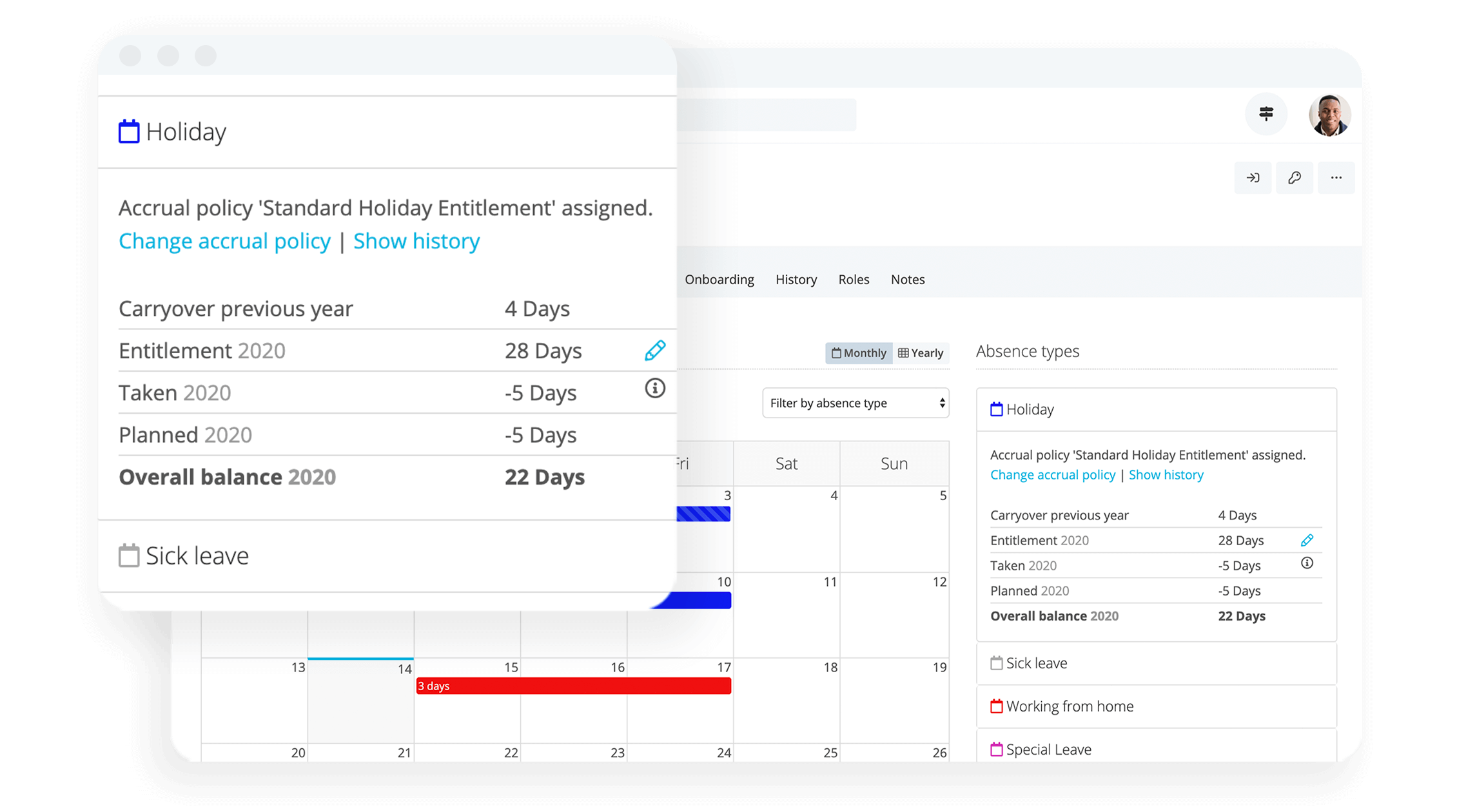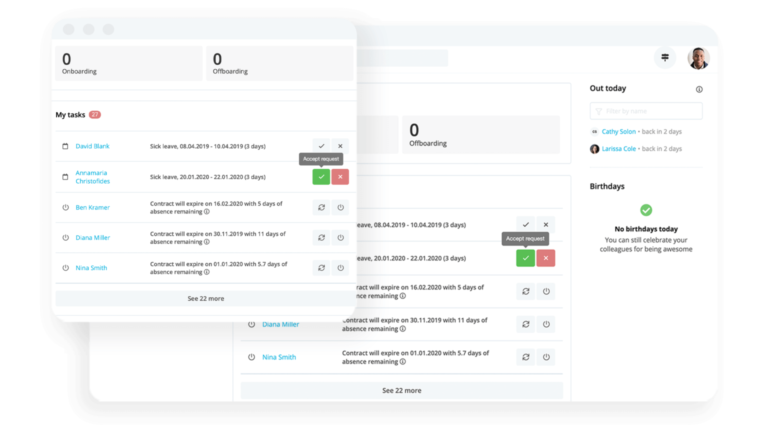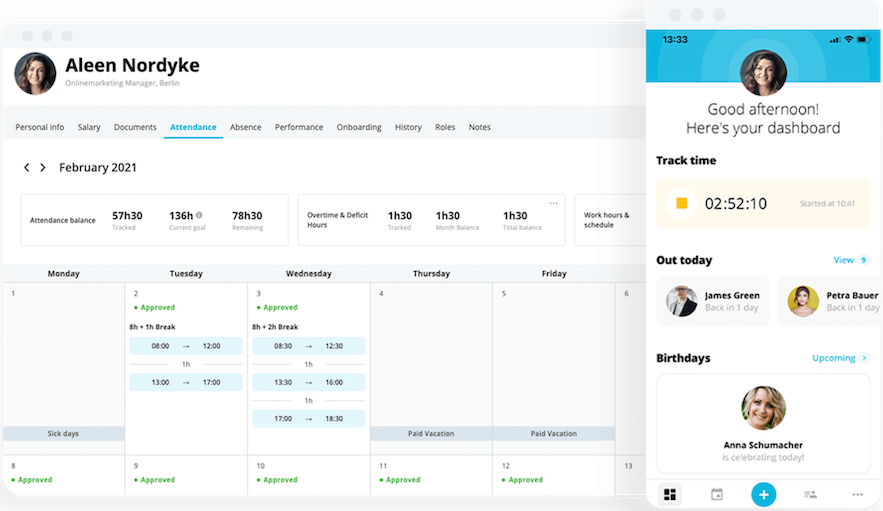
14-Day Free Trial
Track leave, illnesses and bank holidays from one place: Personio.
Book your free demoUnderstanding the Function of HR
What is the function of HR and what does HR do? More specifically, what is HR tasked with doing that can help organisations? In this article, we discuss the definition of HR practices, outline the HR function itself and the value it can truly deliver.
Ready to focus on every element of employee experience? Download our guide.What is Human Resources?
Human Resources (HR) is a term used to describe the organisational function tasked with managing employee experience at each stage of the employee life cycle. It may also refer to an entire organisation’s workforce — a popular term here is also ‘human capital’.
The function of HR is to manage and optimise an organisation's workforce. This typically involves helping recruit, onboard, manage, develop and pay employees. Taken together, doing all of these things well typically results in overall organisational success.
What Does HR Do?
An entire HR department will often manage some of the following core responsibilities:
Onboarding and offboarding
Performance development and training
Absence logging and management
People analytics and overall reporting
Budgeting, workforce planning and more…
On top of this, a Human Resources team may also concern themselves with more intangible parts of running a business. They may need to focus on culture, feedback, employee relations and employer branding.
If we take that into account, we can see that the world of HR is vast and ever-expanding. So, let’s try to hone in a bit more on what makes it unique…
What Makes HR Unique?
The function of HR is unique because of the people in it. Whether an international conglomerate or a local player, HR teams always need to keep their employees in mind.
More specifically, though, HR teams will often have to be very mindful of rules and regulations unique to where they work. And, they may even need to take into account how they differ across countries (England versus Wales, for instance).
When it comes to things like laws coming out of parliament, this is fairly standard. But, in cases like bank holidays, we begin to see some common fault lines.
At the same time, employees in places like the UK also have fairly high standards when it comes to their HR department. Many of them expect these teams to run many processes, and also do it through the ease of software…
What is HR Software?
The United Kingdom is home to a variety of HR software options. Many employees will be completely comfortable with operating within an HR portal, and many HR professionals know the value of a human resources information system (otherwise called an HRIS).
What is the Best HR Software in the UK?
The best HR software for UK business really depends on your needs. There are a whole host of HR systems out there, and they each bring with them their own set of benefits. In a lot of ways, your Human Resources department will hinge on the software you choose.
From cloud HR software to on-premise, there’s a lot to keep in mind. That is why, when it comes to choosing the right one, we recommend:
How much time your teams can save
The return on investment (ROI) a new software can provide
Ease of implementation and support you receive along the way
That said, as much as possible you will want to ensure that all of your HR processes are bundled up in one tool. Or, that you have the ability to integrate with tools that you’re already using (and already enjoy using).
What are Common Human Resources Tasks?
The trouble with finding an answer to the question of "what does HR do" is that, company by company, HR may be doing a hundred different things.
In general, the practice of human resource refer to the methods and processes an organisation uses to maintain and optimise its HR service delivery.
These practices involve the delivery of services throughout their employment life cycle, such as:
Recruitment
Onboarding
Training
Development
Benefits
The administration of each of the above is aimed at ensuring employee satisfaction and engagement continuously trends higher.
Are There Different Types of Human Resources?
If we think about what HR does on a more holistic level, we can start to see two things emerge. We could categorise typical HR activities in two camps:
Granted, this may be an oversimplification. But we think it sums it up nicely.
Taken together, the true function of HR can only meaningfully succeed if they are focusing on both of these things at the same time.
First, let's talk about core HR tasks. These are the tasks and processes that need to happen to “keep the lights on” at any organisation. We might think of things like:
Screening and hiring only the best candidates
Request, approving and tracking sick days
Storing important employee information and documents
Second, we have strategic human resource management (SHRM). Strategic HR is only possible when you have your core tasks locked in. When those processes are humming, you can focus on:
Optimising your already-existing processes (like performance reviews)
Reward-based initiatives (like salary benchmarking, for instance)
We shouldn’t look at core and strategic HR as being in silos. Instead, one hand washes the other, and strategic HR relies on core HR (and vice versa) for the health of a company.
What are Some Human Resource Best Practices?
Some common examples of human resources, spelled out along the employee life cycle, include:
Attraction - Employer branding and recruiting events.
Recruitment - Recruitment and selection processes, candidate screening, time-to-hire metrics, interviewing strategies, workforce planning.
Onboarding - Onboarding processes, storing employee documents, granting access to tools (in collaboration with IT departments).
Retention - Monitoring retention rates, working on employee reward strategies, salary benchmarking, pulse surveys, employee engagement, people strategy.
CareerDevelopment - Developing and running performance cycles, creating performance improvement plans, learning and development (L&D), feedback.
Separation - Offboarding, data security, contractual obligations, notice periods.
15,000 organisations trust Personio for this reason

Just like LUSH and Premier Inn, trust Personio's all-in-one HRIS to upgrade your people operations for now and into the future. Click below to learn more about us.
Book Your DemoHow Can Human Resources Benefit a Company?
There are three major benefits to empowering your Human Resources department, elevating them to the role of an HR business partner. These include:
A Greater Talent Life Cycle - Whether it’s locking down amazing talent, or keeping them happy, your Human Resources team can ensure that your top performers stay top performers (and stay at your company for longer). You should see your HR team as a key enabler of retaining your top talent.
A Savings Centre - An HR team that is equipped with the right data is better able to make business-forward decisions. Many organisations view HR as a cost centre, when it is truly a savings centre. You simply need to let your HR team work to figure out where processes can be leaner and people can be more productive.
A Game-Changing Culture - When an HR team is better able to focus on big-picture projects, it can help boost your overall company culture. This might include focusing on diversity and inclusion, productivity improvements and anything else.
That said, these are simply the top three benefits. There are plenty of other reasons to further empower your HR team. But, you need to give them the tools to shine.
How Do You Start A Human Resources Department?
An organisation without a Human Resources department is like a boat without a rudder. You may be able to go places, but you will lack direction when it comes to your most important asset: your people. So, how do you start a great HR department?
First, you need to consider your HR department structure. Who will head up your function? Will it be your CEO or another member of the C-suite? Will you hire a Chief People Officer?
Or, do you want to build from the ground up? This may involve hiring an HR manager and having them begin to plug the gaps. In any event, you need to structure your team to fit your organisation’s unique needs.
What Should HR Do First?
The best place to start with your Human Resources department is by focusing on the tasks that absolutely need to happen in your organisation. This might include:
Collecting important employee documents and data.
Creating a system for requesting holiday and other types of leave.
Managing any open positions you have and the interview process.
Craft a meaningful onboarding process that can scale with your organisation.
To be fair, that is a lot to ask. So, it would help your organisation to really identify where, currently, you are experiencing the most pain. Then, get to work with the right tool.
Is Human Resources Software Necessary?
For all the reasons above, we have to say that HR software is almost mandatory for UK businesses of any size. Whether you have a small team that needs a strong foundation, or you’re scaling fast and simply trying to keep up, HR software can change everything.
So, it becomes more a matter of which HR software is truly necessary. That is going to be a bit more personal for each company, but there are some grounding factors that you need to consider:
Strong data protection standards
A variety of features to tackle everyday work
A range of customer success stories
New ways to think about your work
Which Human Resources Practices Should Be Automated?
The topic of HR automation is a big one, and many teams may be thinking about ways to streamline and automate many of their everyday tasks and processes. That in mind, how do you pick the right tasks to automate?
We always recommend starting with the numbers. That means taking a hard look at your HR KPIs and then working with your Human Resources team to see which tasks are currently taking up the most time.
If we look at automation like an onion, there are distinct layers that begin to emerge. Start with the tasks that are truly draining time away from your team. This could include logging absences or inputting data from new employees.
Then, focus on the tasks that can benefit qualitatively from automation. Things like onboarding, where you can test out new processes and roll them out as templates, or performance cycles (where you can focus on the quality of conversation and not simply ensuring it happens at all).
Automation can unlock a whole universe of potential, both for your Human Resources department and your overall business. But, you need to do it with intention and you need to do it in stages – starting with the small tasks and graduating up.
Is There HR Software for Small Businesses in the UK?
Of course! There are a multitude of HR software solutions for small businesses in the UK. Personio is just one example, but we have put together our own success plans to help small businesses hit the ground running with the HR work that really makes a difference.
Meet The People Operating System
WATCH: Get to know Personio in three minutes

We need your consent to load this service!
This content is not permitted to load due to trackers that are not disclosed to the visitor.
Personio is an all-in-one HR software designed for every stage of the employee life cycle.
Using Personio, you can manage all your most important HR processes from one place. Recruit, manage, develop and pay your employees from one centralised HRIS.
For HR professionals, you can unlock new levels of productivity and influence. Become the HR business partner that your business needs, by getting back time for what matters: your people.
For line managers, Personio seamlessly builds automated performance cycles, tracks vacation days and keeps employee information up-to-date (and in a compliant fashion).
For employees, no more fussing with cumbersome tools and processes. Employees can request days off, change their information and keep track of goals and more. All from one place.
Speak with an expert today about your HR needs and how Personio can meet them. Or, give Personio a spin for yourself by starting your very own free trial right now. It’s all yours for 14 days.
